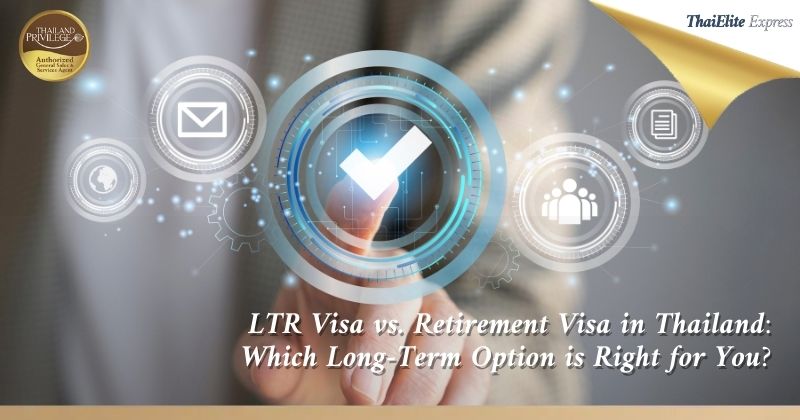
Thailand remains one of the most popular destinations for expats looking to enjoy a better quality of life. With its tropical weather, affordable cost of living, and rich cultural experiences, the country attracts everyone from digital nomads and remote workers to retirees seeking peace and comfort. If you’re planning to stay long term, the most popular visa options are the Long-Term Resident (LTR) Visa and the Retirement Visa. While both provide pathways to enjoy life in Thailand for extended periods, your choice will depend on your lifestyle, age, income, and whether or not you plan to work.
The LTR Visa Thailand program is part of a government initiative to attract highly skilled professionals, digital nomads, and wealthy global citizens. It offers long-term security and several benefits for those who wish to live and work legally in Thailand. If you’re a foreign expert in technology, healthcare, or finance—or if you work remotely for an overseas company—the LTR Visa provides a strong legal framework to support your lifestyle and career. Applicants under this program can enjoy up to 10 years of residency (issued as an initial 5 years, with the option to renew for another 5), a digital work permit, streamlined immigration services, and even tax perks, including a 17% personal income tax rate for eligible professionals. The LTR Visa also includes fast-track immigration processing and exemptions on foreign income remitted into Thailand, making it one of the most attractive residency options for working expats.
On the other hand, the Retirement Visa Thailand is a more traditional option for individuals aged 50 and older who are no longer working and wish to settle down in the Land of Smiles. This visa is ideal for those who want to enjoy a low-maintenance lifestyle, take in Thailand’s scenic landscapes, and live comfortably on a fixed income. To qualify, applicants must meet certain financial requirements, such as maintaining at least 800,000 THB in a Thai bank account, earning a monthly income of at least 65,000 THB, or a combination of both that totals 800,000 THB annually. While this visa requires annual renewals, it offers enough flexibility for retirees who wish to travel in and out of the country, with multiple re-entry permits available.
When deciding between the LTR Visa and the Retirement Visa, it’s essential to consider your personal goals and current situation. The LTR Visa is best suited for individuals who are still active in the workforce, running a business, or who have significant financial resources and want a more stable, long-term solution without the hassle of yearly renewals. It’s also a great option for those seeking professional growth or those who want to immerse themselves in Thailand’s growing tech and innovation ecosystem. For example, hubs like True Digital Park in Bangkok provide LTR Visa holders with the perfect environment to connect with startups, work remotely, and enjoy community support.
The Retirement Visa, meanwhile, remains a solid and accessible choice for retirees who prioritize simplicity and affordability. While it lacks the work authorization and tax advantages of the LTR Visa, it fulfills the basic needs of most retirees looking to enjoy their golden years in a peaceful, scenic country that offers excellent healthcare, a welcoming community, and a laid-back way of life.
Ultimately, the best visa for your long-term stay in Thailand will depend on your age, financial profile, and whether you envision your future here as one of leisure or continued professional engagement. Both visa options open the door to a fulfilling life in Thailand—but by choosing the right one, you can make sure your experience matches your goals.
If you’re still unsure which visa is right for you or need help applying, consider speaking with us for a complimentary 30 minutes consultation. With the right support, you can enjoy a seamless transition to your new home in Thailand—whether it’s for work, retirement, or a bit of both.
Disclaimer: The content on this website is provided for general informational purposes and should not be interpreted as legal, financial, or professional advice. While we make every effort to ensure the information is accurate and current, some details may be subject to change or may not be fully up to date. We do not accept liability for any actions taken based on the information presented.

Learn where to get Thailand’s long-term visa via the Thailand Privilege Card. Direct vs authorized agent, 10-step checklist, verification steps,...
Read MoreThis guide explains the step-by-step process, typical timeline, fees, and the most common reasons LTR applications get delayed or rejected.
Read MoreThailand provides multiple pathways for foreigners to live in Thailand long-term. Your best option depends on your age, financial situation,...
Read More
